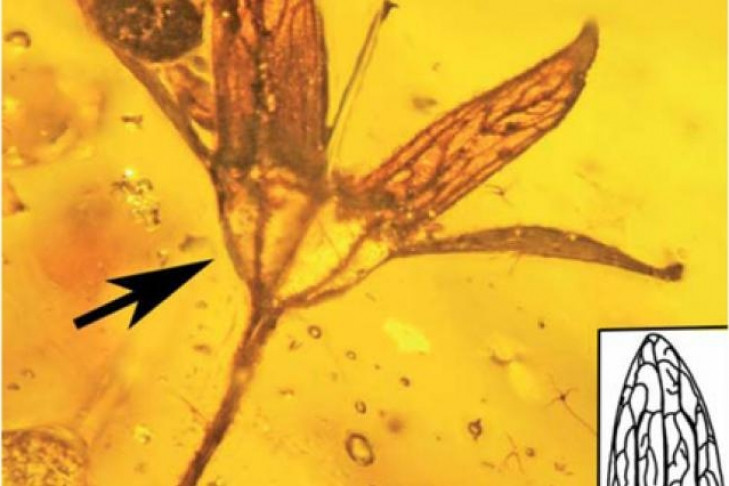The flower is 100 million years old as freshly picked in amber
Seven flowers are perfectly preserved in 100 million years of amber in Myanmar, being passed by the tyrannical dinosaur falling from the tree.
The researchers found transparent amber blocks in Myanmar, which contained seven tiny flowers with a width of 3.4 to 5mm, Phys.org reported on Aug. 15. The intact flowers belong to a little winged flower in the rain forest, which existed 100 million years ago in the Cretaceous period.
According to the research team, this is the largest collection of flowers from this time ever analyzed. They said the newly-picked flowers, though hundreds of millions of years have passed since fossils formed.

The flower is preserved intact in the amber mass for 100 million years.(Photo: University of Oregon).
"Amber stores the parts of the flower so well that they look like they've just picked from the garden. The dinosaurs can brush the branches, causing the flowers to fall and stick to the plastic of the bark of the canopy. then fossilized and became amber, "said George Poinar Jr, emeritus professor at the University of Oregon, USA.
Scattered plants have a family of kauri pine growing today in New Zealand and Australia. Kauri pine trees produce a special resin that can survive in all weather conditions.
All 7 flowers in the amber blossoms have radios radiating in all directions. Based on this feature, they are named Tropidogyne pentaptera (T. pentaptera) , using the Greek word meaning number 5 (penta) and wing (pteron). The researchers compared the flowers to another species called Tropidogyne pikei (T. pikei), which was recently discovered in amber and found some notable features.
"The new flower has a radiant lattice, a nectar plate and an internal groove like T. pikei. But the difference lies in the two ovals, along with a long, slender shape and the grooves in The rimless ovary is as dark as T. pikei, " Professor Poinar Jr said.
T. pentaptera and T. pikei are all classified in the family Cunoniaceae, which still exists today.
The 100-million-year-old flowers are very similar to the Australian tree name coach wood tree . The tree grows over 36 meters tall and lives for centuries, but distributes over 6,400km from Myanmar.
- Discovered the dead body stuck in amber 99 million years
- The dragonfly trapped 100 million years in amber
- Discover intact marine life in amber 99 million years
- The discovery of gecko fossils lies in amber dating from nearly 100 million years
- Mushrooms are 50 million years old in amber mass
- Amazingly discovered about the 100 million-year-old bird in amber
- Young snakes die hard in amber graves 99 million years
- Dead bugs stuck in 99 million years of amber and pollen
- Found samples of amber weighing more than 2kg in Kaliningrad
- India discovered amber plates dating back 50 million years
- The most intact bird fossil in amber 99 million years
- The dinosaur tails remain intact in the amber mass of 99 million years
 Discovered an ancient centipede fossil 99 million years old
Discovered an ancient centipede fossil 99 million years old Discovered bat-like dinosaurs in China
Discovered bat-like dinosaurs in China Discovered a 200-year-old bronze cannon of the coast
Discovered a 200-year-old bronze cannon of the coast Discover 305 million-year-old spider fossils
Discover 305 million-year-old spider fossils Instructions on how to choose lilies to play Tet with lots of leaves at the beginning of the year
Instructions on how to choose lilies to play Tet with lots of leaves at the beginning of the year  Strangely, wolves in Ethiopia love to eat nectar.
Strangely, wolves in Ethiopia love to eat nectar.  See 3 extremely rare snow flowers that are under national protection in China
See 3 extremely rare snow flowers that are under national protection in China  AI robot helps detect diseased tulips
AI robot helps detect diseased tulips  Top 4 flowers, no matter how beautiful they are, should not be displayed in the house lest they affect health
Top 4 flowers, no matter how beautiful they are, should not be displayed in the house lest they affect health  Azuma Makoto - Pioneer in the project of bringing trees into space
Azuma Makoto - Pioneer in the project of bringing trees into space 